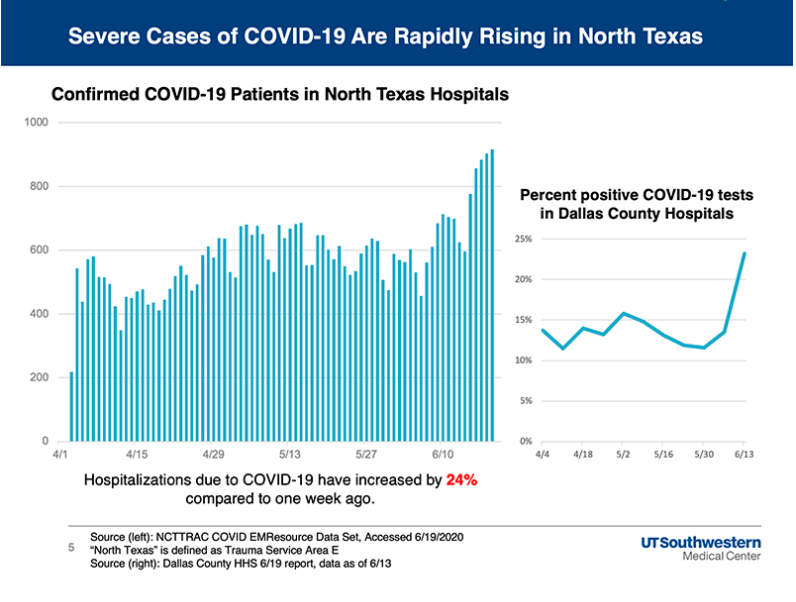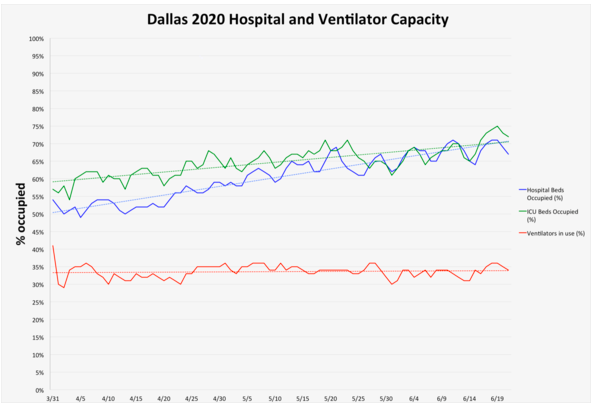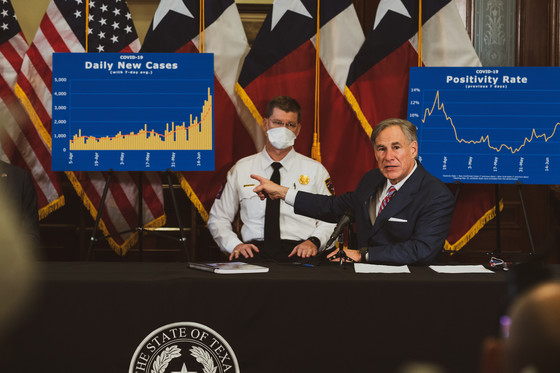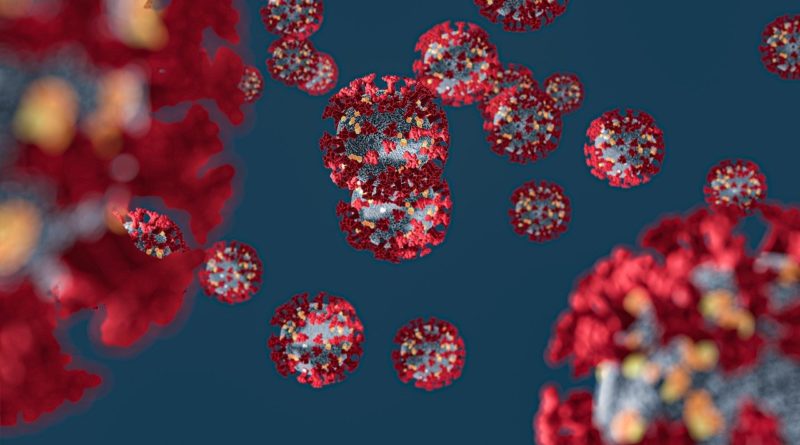UTSW Experts Predict Increased COVID-19 Hospitalizations Ahead Of July 4
As state and local officials continue to monitor the state of the COVID-19 pandemic and provide guidance about the most effective ways to prevent its spread, there’s a lot of information to take in. Here are today’s bullet points:
- UTSW Experts Predict Increase In COVID-19-Related Hospitalizations Ahead Of Fourth of July
- Dallas County Reports New Largest Single-Day Increase In New COVID-19 Cases
- Abbott: COVID-19 Spreading ‘At An Unacceptable Rate’
- Alcohol-To-Go Here To Stay?
UTSW Experts Predict Increase In COVID-19-Related Hospitalizations By Fourth of July

UT Southwestern experts said Monday that models show a spike in COVID-19-related hospitalizations in DFW and are predicting a potential 20% surge in hospitalizations over the next two weeks.
Dr. Mujeeb Basit, an assistant professor of internal medicine and cardiology, said the models, which are based on patient data from Collin, Dallas, Denton, and Tarrant Counties, show the percentage of COVID-19 tests coming back positive are increasing, and new cases and hospitalizations continue to rise. Specifically, the UTSW data shows that hospitalizations because of COVID-19 increased by 24% compared to one week ago.

“They’ve been the highest numbers that we’ve ever seen in the DFW area and this is system wide,” Basit said of COVID-19-related hospitalizations in the region during the Monday press conference.
He also said the recent rise in cases and hospitalizations is more likely attributable to Memorial Day gatherings, rather than recent protests.
“I would say we’re still seeing the Memorial Day effect from this. The protests are quite challenging to model because the… effect in the increased number of cases that we have from the protests is probably offset by the increased number of people that stayed home and did not gather,” Basit said. “We saw a similar bump that we saw around Easter and Mother’s Day.”
Basit said the data also shows an increase in new COVID-19 cases reported among those aged between 21 and 40.
In June, the data shows 50% of those requiring hospitalization were under 50, and 30% of those requiring critical care were under 50.
Dr. Julie Trivedi, assistant professor of internal medicine and infectious disease, encouraged people to maintain 6-feet social distancing, practice good hygiene, and wear a mask in public.
Dallas County Reports New Largest Single-Day Increase In New COVID-19 Cases
Dallas County Health and Human Services Monday reported a record 454 additional positive cases of COVID-19, bringing the total case count in Dallas County to 17,299, as well as an additional three deaths.
The latest deaths include a 30-something-year-old Dallas man, a 40-something-year-old Dallas man, and a 60-something-year-old Irving man. Two were hospitalized and all had underlying, high-risk health conditions, the county reports. One was found deceased at home.
An increasing proportion of COVID-19 cases in Dallas County are being diagnosed in young adults between 18 and 39 years of age, such that of all cases reported after June 1, almost half have been in this age group.
More than 80% of cases requiring hospitalization who reported employment have been critical infrastructure workers, with a broad range of affected occupational sectors, including healthcare, transportation, food and agriculture, public works, finance, communications, clergy, first responders, and other essential functions.
Dallas Mayor Eric Johnson Monday shared that 25 hospitals reported bed and ventilator capacity. Of 6,083 total beds, 4,055 (67%) were occupied, of 943 total ICU beds, 683 (72%) were occupied, and of 960 total ventilators, 327 (34%) were in use.

More than two-thirds of cases requiring hospitalization have been under 65 years of age, and about half do not have any high-risk chronic health conditions. Diabetes has been an underlying high-risk health condition reported in about a third of all hospitalized patients with COVID-19.
The age-adjusted rates of confirmed COVID-19 cases in non-hospitalized patients have been highest among Hispanic people (667.4 per 100,000), Asian people (187.4 per 100,000), and Black people (136.4 per 100,000). These rates have been higher than among White people (43.8 per 100,000).
Of the 317 total deaths reported to date, over a third have been associated with long-term care facilities.
“Today we’ve seen the largest number of new COVID-19 cases ever reported in Dallas County, a 10% jump from our past highest day. Some of this could be because of increased testing. We know that we’re seeing many more cases out in the community based on the fact that our hospitalizations have jumped a whopping 54% since June 1. As I’ve said before, think of hospitalizations like the tip of the iceberg you see above the water and know that for that tip to grow by 54% since the beginning of this month, the iceberg below it must have grown exponentially,” said Dallas County Judge Clay Jenkins.
“I’m very pleased by the compliance with our masking policy which won’t officially go into effect until Wednesday. When traveling to stores, my staff reported, and I experienced, that everyone in the places that we went, were already wearing their masks. Face coverings are the single best way to control the spread of the virus based on new scientific evidence from studies that were performed after the beginning of the COVID-19 epidemic. Although the law only requires face coverings for people that are 10 or older, the CDC recommends masking every person over the age of 2. I strongly recommend that your children between the ages of 2 and 10 wear a mask as well as when within 6 feet of people outside your home.”
Abbott: COVID-19 Spreading ‘At An Unacceptable Rate’
As hospitalizations for COVID-19 continue to rise, Gov. Greg Abbott during a Monday press conference called on Texans to maintain good hygiene, maintain safe social distancing, and wear a face mask in public.

The Texas Department of State Health Services reports 3,711 COVID-19 patients were in hospitals across the state as of Monday.
“To state the obvious, COVID-19 is now spreading at an unacceptable rate in Texas, and it must be corralled,” Abbott said. “I know that some people feel that wearing a mask is inconvenient or that it is an infringement of freedom, but I also know that wearing a mask will help us to keep Texas open.”
He added the state has strategies to reduce the spread of COVID-19, but didn’t outline new measures to do so.
“Closing down Texas again will always be the last option,” Abbott said.
He said authorities are increasing enforcement, though. For example, he said the Texas Alcoholic Beverage Commission have temporarily suspended licenses of bars that aren’t in compliance with his orders regarding capacity and some local authorities, including Dallas County, have new mask requirements for businesses.
Alcohol-To-Go Here To Stay?
Abbott on Saturday again signaled his support for continuing to allow alcohol-to-go sales in Texas.
“This has my support!” Abbott tweeted.
This has my support!
Restaurants begin push to make alcohol-to-go permanent in Texas.#txlegehttps://t.co/2MjMQBJ9tG— Greg Abbott (@GregAbbott_TX) June 21, 2020
The Texas Tribune reports the Texas Restaurant Association submitted a proposal to Abbott’s office requesting the waiver be expanded to also allow mixed drinks with liquor to be prepared, resealed, and sold.
Per Texas Alcoholic Beverage Commission guidelines, restaurants can only serve liquor in manufacturer-sealed bottles and with the purchase of food.










